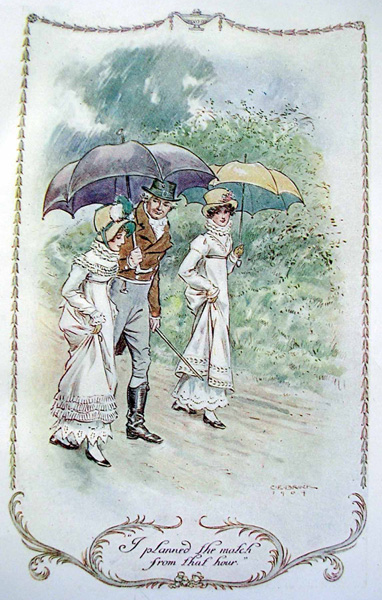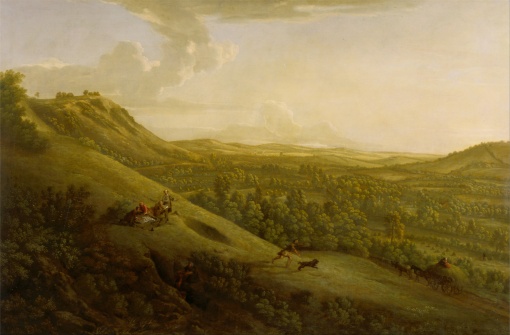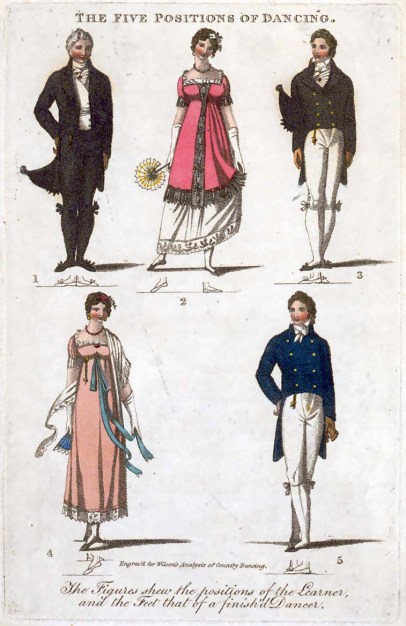Between the Pages is a new, weekly blog series which explores the life, times and creative works of well-known authors. I plan to run the blog series until the end of 2015, focusing on one author per month. New posts every Tuesday.
The first post in the series is a brief biography of the author, the second looks at the historical period of the author, and the third post discusses their creative works. Finally, the last post includes selected quotations and short excerpts by the author.
Jane Austen lived from 1775 – 1817, a period in British history which is known as the Georgian era. The Georgian period lasted from 1714 – 1837 and it includes the Regency period from 1792 – 1837, after which the Victorian era began. In this post, I am curious about exploring this era and the impact of Jane Austen’s times on her writing.
One of the most notable influences of the Georgian era is the presence of the class system in Austen’s novels. Emma springs immediately to mind, as the social system of the time infuses the novel. In the following excerpt, Emma expresses her disapproval of her friend and protégé, Harriet Smith, marrying someone who is beneath her social status.
“Mr. Martin may be the richest of the two, but he is undoubtedly her inferior as to rank in society.—The sphere in which she moves is much above his.—It would be a degradation.”
This is despite the fact that Harriet Smith is not someone who has a high social rank: she attends a local school for girls and she is the “natural” (i.e. illegitimate) daughter of somebody who doesn’t appear in the novel. For some reason, most likely because she is bored and seeking a project, Emma decides to take Harriet under her wing and advise her about love and marriage, with amusing consequences. Fortunately, sensible Mr Knightley manages to avert some of the potential bad choices which almost result from Emma’s misguided advice.

Emma likes to meddle and tries to be a match-maker, with amusing consequences!
Image source: Wikipedia
There is evidence of the impact of class elsewhere in the novel, which also provides an example of social status and the role of women. Miss Bates is an older, unmarried woman who lives with her mother in Highbury village. They live modestly without much money.
To me, Miss Bates seems to be a tragicomic figure in the novel. She is excessively talkative in a comical way, but she also illustrates the hardships that single women faced during an era when women had few choices other than marriage. I think Miss Bates epitomises this quote from one from Jane’s letters to her niece, Fanny Knight:
“Single women have a dreadful propensity for being poor…which is one very strong argument in favour of matrimony” — March 1817
Of course, Emma is a snob and she looks down on people who don’t share her social circle or her manners of behaviour. In one memorable — and very sad — scene in the novel, Emma insults Miss Bates to her face and makes her the object of unkind teasing.
In Chapter 43, during a picnic outing to Box Hill, Emma suggests a game to play in which people must say “either one thing very clever, be it prose or verse, original or repeated — or two things moderately clever — or three things very dull indeed“.

A 1733 painting of Box Hill, painted by George Lambert
Image source: Wikimedia Commons
When Miss Bates replies that she will easily be able to take part in the game and meet the last requirement, Emma cruelly jokes: “Ah! ma’am, but there may be a difficulty. Pardon me, but you will be limited as to number — only three at once.“
Poor Miss Bates is pained by this public insult as she realises that Emma is poking fun at her loquacity:
Miss Bates, deceived by the mock ceremony of her manner, did not immediately catch her meaning; but, when it burst on her, it could not anger, though a slight blush showed that it could pain her.
From Emma, we can infer that unless you had a considerable income of your own (e.g. an heiress with a fortune), single women were destined to be viewed as spinsters and old maids, often the objects of pity and ridicule. In Chapter 10, Emma advises Harriet that:
“A single woman, with a very narrow income, must be a ridiculous, disagreeable old maid! — the proper sport of boys and girls — but a single woman, of good fortune, is always respectable, and may be as sensible and pleasant as any body else”
It probably won’t come as a spoiler (at least, I hope it does not!) to tell you that Jane Austen’s novels end happily, with problems being resolved and a bright future for the key characters. Out of all of Austen’s heroines, none remain unmarried by the time you finish reading the final page.
As we discovered in the last Between the Pages post, Jane Austen had more freedom as an unmarried woman, even if there was a certain unflattering stereotype about old maids. She had the freedom to write her novels; however, there were restrictions even there. Women could write what they liked, of course, but it was widely considered more appropriate for them to write under a pseudonym in order to avoid public scrutiny.

Jane Austen’s handwriting — her signature from her April 1817 will
Image source: Wikipedia
Jane Austen published her novels as “A Lady”. Sometimes, she had fun with pseudonyms: when she had to write to a publisher to remind them about her novel, she once used the name, Mrs Ashton Dennis, so she could sign her letters as MAD. I think this shows her sense of humour!
Pseudonymous publishing by women continued into the Victorian era: as we will see in a future instalment of Between the Pages, the Bronte sisters used pseudonyms too. And there were legal as well as social restrictions. It is shocking to think that “Married women had no legal existence” (Fergus, 1997, p. 14), meaning that “they could not own property or sign contracts” (ibid.).
But, of course, marriage is central to Jane Austen’s novels. As with every social event in this period of history, courtship was subject to strict etiquette. Unless they were engaged, it wasn’t socially acceptable for men and women to communicate with each other without a chaperone.

Dancing was a popular way for men and women to meet and get to know each other.
Image source: Wikipedia
Strictly speaking, they weren’t even allowed to write letters to each other without being engaged, although I can imagine that not everyone followed the rules all the time! In Sense and Sensibility, impulsive Marianne Dashwood — smitten with Willoughby — writes him a succession of letters despite not being engaged.
Despite the strict social restraints, at least Georgian women had a choice about marriage, and they were free to turn down proposals. Jane Austen leaves us with no doubts about her views on matrimony: all of her heroines marry for love.
The topic of Jane Austen’s era is so vast that this blog post only covers two key aspects of her novels. Historians and scholars write whole books about these topics, so this post is a very simplified and shortened overview. If you are interested in reading more, I recommend the following, which I used when I researched this post.
Factual info (and Fergus quote) sourced from The Cambridge Companion to Jane Austen, (2008), edited by Edward Copeland and Juliet McMaster. Cambridge: Cambridge University Press.
Jane Austen in Context, (2005), edited by Janet Todd. Cambridge: CUP.
Next time in Between the Pages, we’ll discuss Jane Austen’s novels. What makes them so popular 200 years after they were first published? What is Austen’s style of writing, and how does she portray her characters? See you next Tuesday!


Thank you! A lovely precis of “Emma” in relation to its cultural position. 🙂
LikeLiked by 1 person
Thank you. 🙂 I would have liked to delve into the Georgian period in more detail, but unfortunately I didn’t have enough time to do that. So I just picked what I think are the two most salient cultural aspects from one of Austen’s novels.
LikeLike
Pseudonymous publishing by women still continues apparently. Sharon Bolton has only recently started calling herself that – all of her earlier novels were published as SJ Bolton. She wrote an interesting blog post on the reasons for the change which made it clear that, in crime fiction at least, women are sometimes advised to use initials so their gender isn’t immediately obvious. Apparently, men are less likely to buy books that are obviously written by women. Maybe in another two hundred years…
LikeLiked by 1 person
Frustratingly, I can imagine that is quite common.
I remember reading an interview with J.K. Rowling in which she spoke about being advised to publish the Harry Potter books using her initials, because the publishers thought that boys wouldn’t want to pick up a book written by Joanne Rowling.
LikeLiked by 1 person
I’ve actually never read Emma (not sure why) but your brief snippets make me want to read it asap! While it’s rather unfortunate that marriage was viewed as the only thing that guaranteed a woman’s happiness, there’s at least the option of turning down proposals, like you mentioned. Of course, I can imagine what doing that might inflict upon a girl’s family, especially if they felt that she was turning down a good match!
LikeLiked by 1 person
Emma is a fun read. She’s an irritating heroine at times (Jane Austen herself called Emma “a heroine whom no one but myself will much like”), but I think she is one of JA’s most complex heroines. The novel itself is filled with so many characters who are all wonderfully portrayed; it has darkness and light and plenty of humour.
Great point! I expect a lot of pressure was put on young women by their families, as we see directly in Pride and Prejudice when Elizabeth refuses the odious Mr Collins. Mrs Bennet is furious, and Mr Bennet responds wittily:
“An unhappy alternative is before you, Elizabeth. From this day you must be a stranger to one of your parents. — Your mother will never see you again if you do not marry Mr. Collins, and I will never see you again if you do.”
😀
LikeLiked by 1 person
Pingback: Between the Pages: Quotes from Jane Austen | Cultural Life
Pingback: A Very Literary Christmas – Part I | Cultural Life